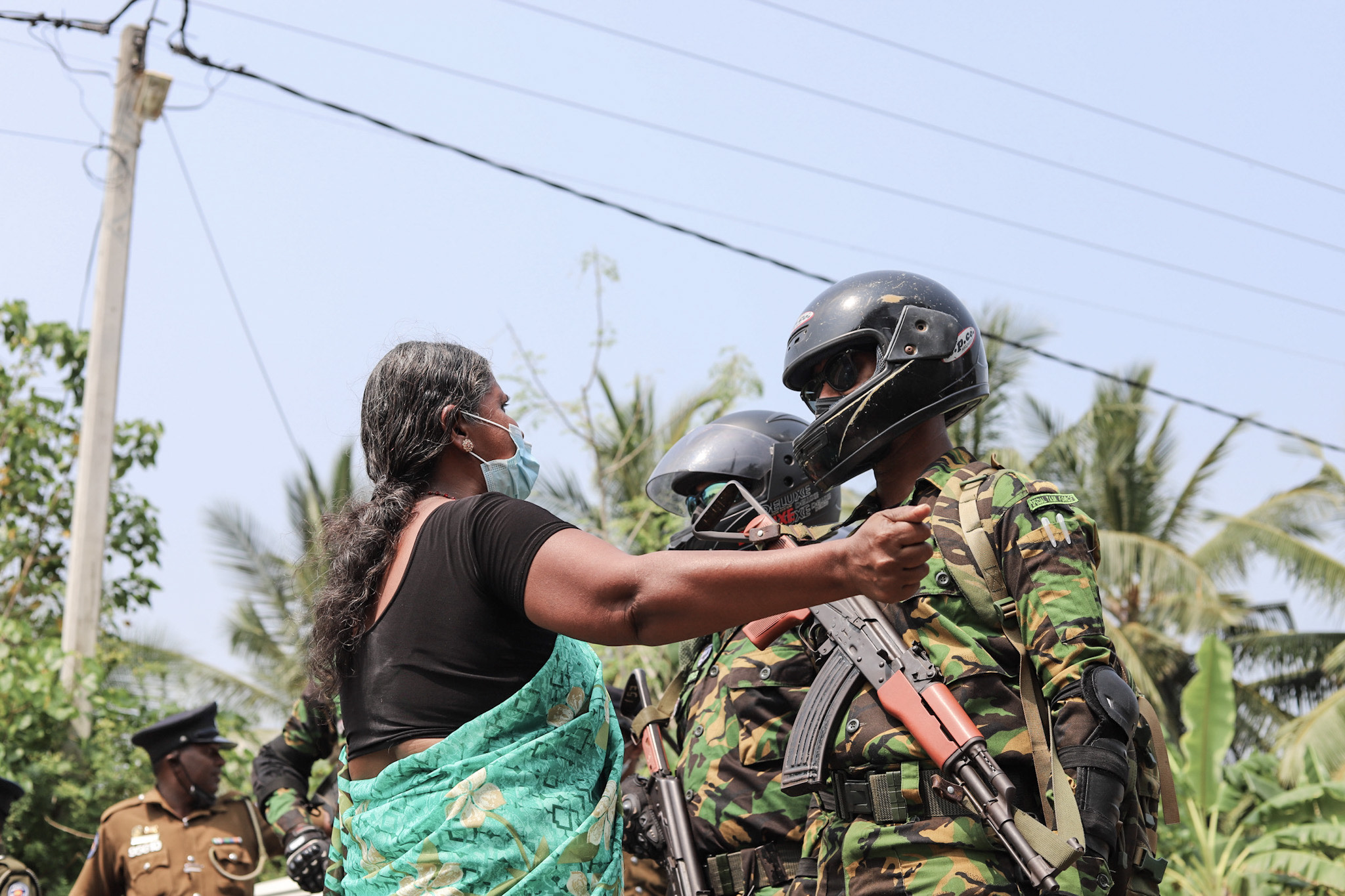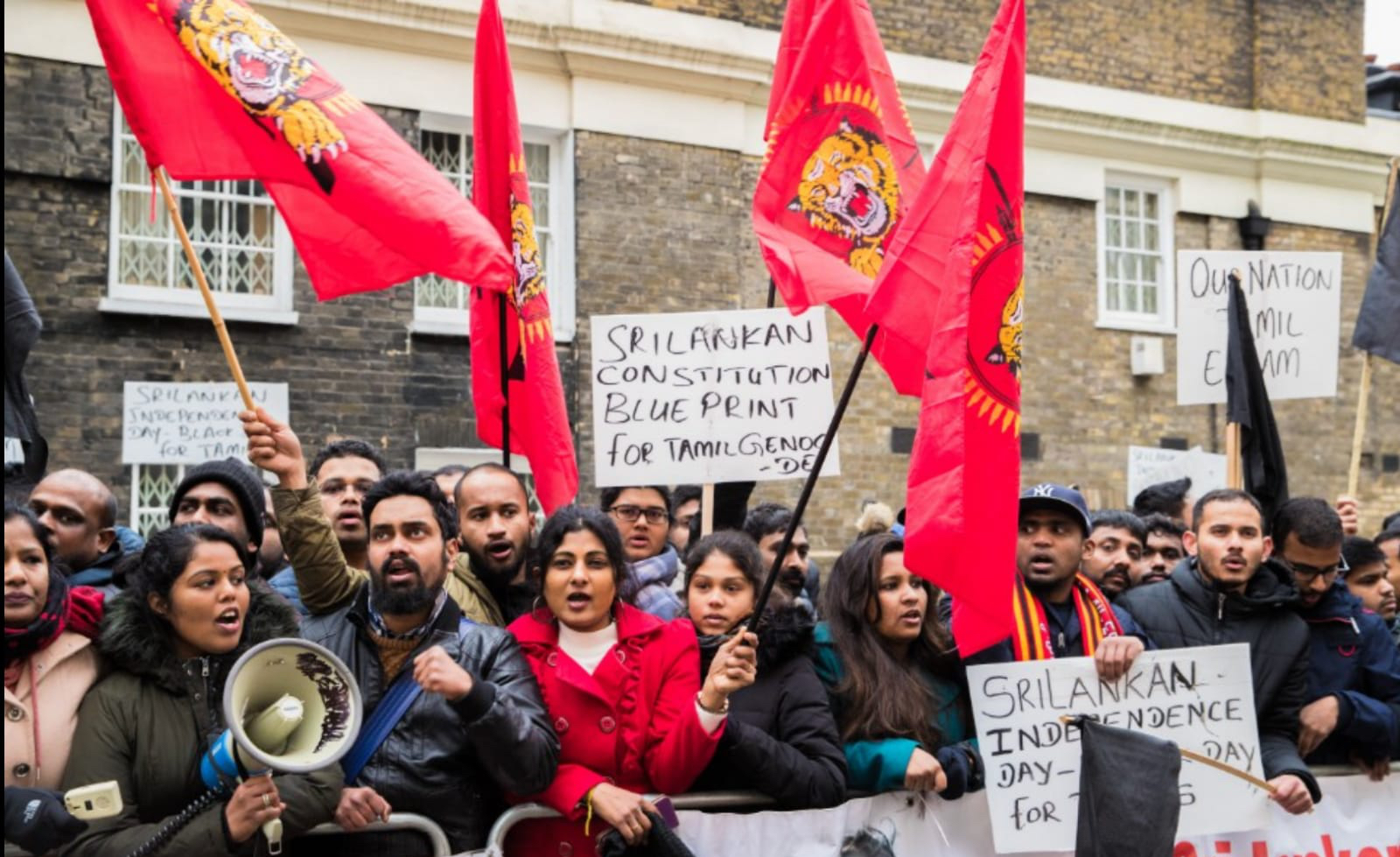
A protesting Tamil mother faces off against a Sri Lankan soldier last week, just days before Rajapaksa's remarks.
As Sri Lanka’s president claimed to welcome the global Tamil diaspora to invest in the cash-stricken country, many across the world remain wary - particularly as corruption, human rights abuses and repression of the Tamil people continues on the island.
"This is all just a farce," said Theepan*, a Tamil rights activist based in Switzerland. “After forcing us out of our homeland, torturing, raping and killing us, now the Sri Lankan state needs our help."
Rajapaksa’s overtures to the diaspora come as Sri Lanka faces an economic crisis that has plunged many into poverty across the island, amidst falling reserves and soaring prices of basic goods. After meeting with Tamil National Alliance (TNA) lawmakers, the establishment of a North-East Development Fund with investment from the diaspora was floated.
The Eelam Tamil diaspora, estimated to be more than one-million strong, is spread across the globe and have been instrumental in leading campaigns for justice and accountability for war-time atrocities. Notably, the diaspora has also excelled in several areas, from the arts and entertainment, to business and healthcare earning praise from politicians and prime ministers around the world.

Canadian Prime Minister Justin Trudeau celebrating Thai Pongal with the Tamil community in Toronto, 2018.
But despite the diaspora’s success, Sri Lankan state repression of Tamils has hindered hopes of an economic revival, particularly in the North-East. And on the island and around the world, there are reservations about investing in any such diaspora fund, especially if the Sri Lankan state is involved.
"Given the level of militarisation, impunity and corruption on the island, why would we invest?" commented Seelan*, a British Tamil who has been involved with co-ordinating professionals in the UK. “There isn’t even an impartial and independent judiciary in Sri Lanka to sort out any legal issues.”
The raising of diaspora investment comes almost 13 years since the end of the armed conflict, in which tens of thousands of Tamils were massacred by the Sri Lankan state. Yet, despite more than a decade passing, human rights abuses continue. Last week, a report in The Guardian highlighted the ongoing torture of Tamils in the North-East. In recent months, dozens have reportedly been detained under the draconian Prevention of Terrorism Act (PTA), with many more Tamils reportedly still languishing in Sri Lankan prisons.
“They’re oppressing our people with one hand and pleading for our money with the other,” said Nades*, a British Tamil activist who has been involved in political campaigns for several years.
And whilst the idea of diaspora financial investment may be being welcomed by the Sri Lankan state, another obstacle remains. Several diaspora organisations and individuals remain banned, listed as ‘terrorists’ by the government. Even though many of these organisations function freely in many places around the world, including Europe, Canada and the United States, they risk arrest if they were ever to travel to Sri Lanka. Individuals on the island who interact with them are also liable to prosecution by Sri Lankan authorities.

British Tamils protesting on Sri Lanka's Independence Day in February, 2019.
“It’s insulting,” continued Nades. “They want our money but refuse to even delist the very people that they are seeking assistance from.”
“Our money is better spent directly supporting grass-root causes, as we have done for decades now,” added Theepan pointing to the hundreds of charities, village and school associations, as well of places of worships across the North-East that receive regular diaspora funding. Millions of dollars are estimated to flow to the island through these organisations every year.
“Many Tamils already have a great connection to the homeland,” said Theepan. “It is the Sri Lankan state that stops and blocks those connections and investment, through militarisation, land grabs and vilification of the diaspora.”
Several senior figures in the Sri Lankan government, from the current foreign minister to the reigning Rajapaksa siblings have repeatedly spoken out against the Tamil diaspora in the past. Indeed, amongst Sinhala politicians in the south, including those seen to be more liberal, the spectre of the Tamil diaspora has repeatedly been raised to inflame Sinhala-Buddhist nationalist sentiment.
“Now this racist, criminal state wants our money,” Theepan added.
Other Tamils in the diaspora pointed to the dire financial situation on the island and how even previous diaspora investments have failed with the state’s mismanagement of the economy.
“Of the many who did invest, they have already lost 50 percent over the past 6 months on the exchange rate alone and now can’t get their money out,” said Kandeepan*, a former senior credit trader who now runs his family office in the UK. “The same applies for people who put money in Rupee deposit accounts because they were offered higher interest rates. Even those who put money in local bank foreign currency accounts will likely lose because the banks are defaulting on foreign currency payments.”
“Everyone who invested has been burned,” he continued. “I very much doubt those watching this crash from the side-lines will dive in.”
With tens of thousands of Sri Lankan troops still occupying the North-East, making some areas one of the most militarised in the world according to studies that have been conducted, any investment continues to seem unstable.
.jpg)
A new elite military unit that was raised in Kilinochchi last year, with some of the tens of thousands of soldiers that continue to occupy the Tamil homeland.
"The wealth of the Eelam Tamils in the Diaspora is greater than the entire Sri Lankan economy,” said the Tamil Americans United PAC, a US-based organisation. “The Government of Sri Lanka is trying to tap our wealth. We, the Eelam Tamils, need a permanent political solution through a third-party mediation and an internationally monitored referendum. Until then, Tamils will not and should not engage or invest in Sri Lanka.”
“Remember the history of all the accords signed with the Government of Sri Lanka,” the organisation continued. “All of them disregarded, none of them were implemented.”
"We refuse to send our money to prop up a genocidal state," added Jeyam*, a Tamil-Canadian activist. "Until our homeland is free our investments and our people will never be safe."
That sentiment was shared widely amongst those interviewed by the Tamil Guardian, and amongst lawmakers in the Tamil homeland.
“To have confidence to bring you know their hard-earned monies, they would naturally want a decent political solution first,” said TNA lawmaker M A Sumanthiran, speaking on Tamil diaspora investments last week.
“Of course the diaspora is not just going to come and ah you know dump their money here. They will want security for their investment they will want to do it in the North and the East. They will want to see a political solution happening first because they want to safeguard their investment their investments.”
He went to state “with certainty” that a “permanent political solution that satisfies the Tamil people of this country” would be needed.
Despite Rajapaksa’s apparent comments and the crisis the country faces however, even within the Sri Lankan state there is some reluctance to welcome the Tamil diaspora.
“It has to go through normal Sri Lankan channels, including banking, not anything outside of them,” Justice Minister Ali Sabry commented to the Sunday Times, when speaking on a diaspora investment fund.
“Even after the war, we gave certain incentives so there could be similar tax holidays and probably Government land on long-term lease if they invest there, for instance. It has been done in different parts of the world and country also, if you go to a denominated area or areas identified for investment, like Board of Investment zones.”
“There was no finality,” he concluded.
“We need certain preconditions to be implemented before we can even think of sending our money through such channels,” added Ramanan*, another British Tamil businessman. “First, the state needs to demilitarise the North-East entirely. No business can thrive whilst the army continues to occupy our homeland. Then, they must give the Tamil people self-determination, so we can guide our own future and set our own path.”
“For decades the state has been trying to destroy us. If they are serious about allowing us to rebuild, then it is action that is needed, not more empty words.”
_____
* Names have been changed on request to ensure the safety of Tamils living in the North-East.
We need your support
Sri Lanka is one of the most dangerous places in the world to be a journalist. Tamil journalists are particularly at threat, with at least 41 media workers known to have been killed by the Sri Lankan state or its paramilitaries during and after the armed conflict.
Despite the risks, our team on the ground remain committed to providing detailed and accurate reporting of developments in the Tamil homeland, across the island and around the world, as well as providing expert analysis and insight from the Tamil point of view
We need your support in keeping our journalism going. Support our work today.
For more ways to donate visit https://donate.tamilguardian.com.

